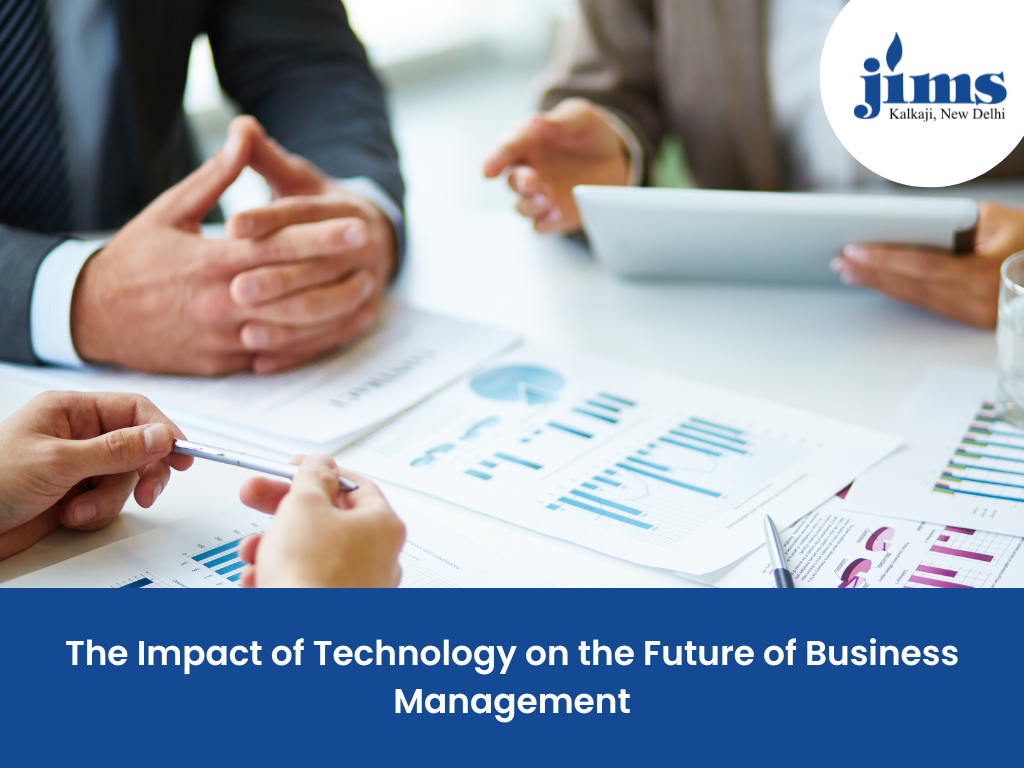Technology is an integral part of modern businesses, and its impact on the future of business management cannot be overstated. In recent years, technological advancements have led to significant changes in the way businesses operate, and this trend is expected to continue in the future. In this blog post, we will discuss the impact of technology on the future of business management and how top MBA PGDM colleges in Delhi NCR, such as JIMS, Kalkaji, are preparing students for this new era of management.
Impact of Technology on Business Management:
Automation:
One of the significant impacts of technology on business management is automation. Automation involves the use of machines, software, and other technologies to perform tasks that were previously done by humans. Automation has led to increased efficiency, reduced costs, and improved accuracy in various business operations, including manufacturing, logistics, and customer service.
Automation has also led to the creation of new job roles, such as automation engineers, data analysts, and machine learning experts. Therefore, it is essential for managers to have a good understanding of automation technologies and their applications to leverage their benefits.
Digital Transformation:
Another significant impact of technology on business management is digital transformation. Digital transformation involves the use of digital technologies to improve business processes, enhance customer experience, and create new business models.
Digital transformation has led to the emergence of new industries, such as e-commerce, fintech, and edtech, and has also enabled traditional businesses to expand their reach and customer base. Therefore, managers need to have a good understanding of digital technologies, such as cloud computing, data analytics, and artificial intelligence, to stay competitive in the market.
Globalization:
Technology has also facilitated globalization, enabling businesses to operate on a global scale. Advances in communication technologies, such as the internet, social media, and video conferencing, have made it easier for businesses to communicate with customers, partners, and employees worldwide.
Globalization has also led to increased competition, as businesses can now enter new markets and reach new customers with ease. Therefore, managers need to have a good understanding of global business practices, cultural differences, and international regulations to succeed in a globalized business environment.
Customer Experience:
Technology has also had a significant impact on customer experience, enabling businesses to provide personalized, seamless, and convenient services to their customers. Advances in customer relationship management (CRM) software, mobile apps, and social media have made it easier for businesses to interact with their customers and understand their needs and preferences.
Therefore, managers need to have a good understanding of customer experience management (CEM) strategies and the latest customer engagement technologies to create a loyal customer base and gain a competitive advantage.
Security:
Finally, technology has also posed new security challenges for businesses. Cybersecurity threats, such as data breaches, phishing, and malware attacks, have become more frequent and sophisticated, posing a significant risk to businesses’ operations, reputation, and finances.
Therefore, managers need to have a good understanding of cybersecurity risks and measures, such as encryption, firewalls, and incident response plans, to protect their businesses from cyber attacks and ensure data privacy and security.
Preparing for the Future of Business Management:
To prepare for the future of business management, students need to acquire the skills and knowledge needed to leverage technology’s benefits and mitigate its risks. Best MBA PGDM Colleges in Delhi NCR, such as JIMS, Kalkaji, are taking various initiatives to equip their students with these skills and knowledge, such as:
-
Curriculum Design:
Top PGDM colleges in Delhi NCR are designing their curriculums to incorporate the latest technological advancements and their applications in business management. For example, JIMS Kalkaji’s PGDM program includes courses on digital marketing, data analytics, and e-commerce, enabling students to gain a good understanding of digital transformation and its impact on business management.
-
Industry Collaborations:
Also collaborating with leading industry players to provide students with real-world exposure to the latest business practices and technologies. For example, JIMS Kalkaji has partnerships with companies such as Grant Thornton Bharat providing students with access to their latest technologies and training programs.
-
Hands-on Experience:
Also providing students with hands-on experience in using the latest business technologies through projects, internships, and case studies. For example, JIMS Kalkaji’s PGDM program includes a summer internship, where students work on live projects and gain practical experience in applying business concepts and technologies.
-
Soft Skills Development:
Also emphasizing the development of soft skills, such as communication, leadership, and teamwork, to enable students to collaborate effectively with diverse teams and stakeholders. These skills are particularly important in a technology-driven business environment, where effective communication and collaboration are essential for success.
Conclusion:
In conclusion, technology’s impact on the future of business management is significant and far-reaching. Advances in automation, digital transformation, globalization, customer experience, and security are transforming the way businesses operate and compete in the market. To prepare for this new era of business management, students need to acquire the skills and knowledge needed to leverage technology’s benefits and mitigate its risks.
JIMS Kalkaji, being amongst the best MBA PGDM colleges in Delhi is taking various initiatives to equip their students with these skills and knowledge, such as designing their curriculums to incorporate the latest technological advancements, collaborating with leading industry players, providing hands-on experience, and emphasizing the development of soft skills. By leveraging these initiatives, students can gain a competitive advantage in the job market and contribute to the growth and success of their organizations in the future.

